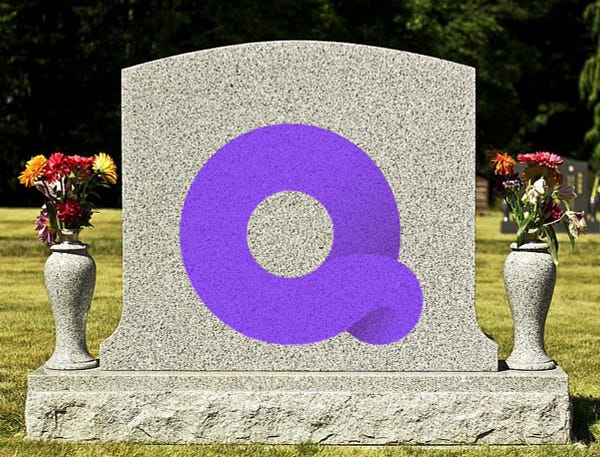Hello, everyone.
A miserable week for Quibi investors, executives, and employees. The company announced it is closing down after less than seven months since commercial launch. 350+ employees are losing their jobs, and investors are recouping 20c on the dollar (likely more once the company sells content and technology assets).
Notice I never mentioned Quibi fans. Judging by the reaction online, the now-dead startup has a ratio of 1000 haters per 1 paying customer. Still, I am reluctant to join in on the negativity - do you want to know why?
Dead on arrival?
Quibi was a risky gamble from the onset. Yet another streaming platform competing for customer attention (and dollars) with the likes of Netflix, Youtube, and TikTok. Disadvantaged by high content generation costs, since it offered Hollywood-quality short-form videos and hence required expensive contracts with A-listers and production crews. Designed to be enjoyed explicitly on the go (no TV app, no browser streaming, no Chromecast), it launched bang in the middle of the pandemic.
Talk about the perfect (shit 💩)storm - the ENTIRE target audience was locked at their homes for months, and tens of millions lost their jobs, too. Watch Quibi on the go to where, exactly?
Long story short - many saw the writing on the wall. The timing might have been unpredictable (the company still had plenty of cash left), yet the outcome itself was not a shocker:
Why so much hate?
Since the company’s announcement of ceasing operations, the outpouring of hate intensified. Is it the first startup to dramatically fail in public, though?
No - Pets.com flopped in 2000, burning 300m in two years. I don’t know how much hate Pets.com received. Back in the day, I was 13 years old and only used my slow dial-up internet to download bikini 👙 pics of Britney Spears.
But judging by my Twitter feed, it is Quibi that seems to be the epitome of everything that’s horribly wrong with the “self-absorbed” tech industry, “wild” capitalism, and “greedy and out-of-touch” billionaire founders in 2020.
Let’s look at three top jibes at Quibi from a slightly different angle.
Jibe no.1 - Quibi’s founders are clueless.

Ok, Jeff Katzenberg is indeed a rich old guy - he is 69 and worth about $900m. Meg Whitman, Quibi’s CEO, is even richer with $5.3bn to her name, and, aged 64, she is not exactly a Gen Z’er, either.
But to imply they’re unprofessional and acted on a “half-assed stereotype” is a tad disrespectful. Especially when you’re talking about someone who ran Disney and co-founded Dreamworks (Jeff). Or, took eBay from $6m to $8bn annual revenues over 10 years (Meg).
Jibe no. 2 - this load of money 💰 should have been spent elsewhere.
According to this argument, there were many better uses for $1.75bn.
Like cinematic passion projects, for example:

Or funding for black female founders:

Or funding for female founders in general:
I could make up many more of those. If you split $1.75bn Quibi raised between over 500k homeless people in the US - you can give each of them $3k in cash. You could also pay 30% of the National Cancer Institute (NCI)’s annual budget and contribute to eradicating cancer. Yadda yadda yadda.
But that’s NOT how opportunity cost works in tech. VCs and LPs don’t choose between a potential unicorn versus a small business run by an underrepresented founder, let alone a social cause. Disney, Google, Alibaba, JPMorgan Chase, Goldman Sachs, and others would have invested their dollars into other startups - and 9 out of 10 startups fail in any case.
Jibe no. 3 - layoffs to the soundtrack from Trolls.


OK, this was dumb. Period.
However, portraying Jeff as a cruel, uber-rich founder, ignorant of his employees’ concerns and fears, and trolling them with the Trolls soundtrack for the last hurrah doesn't seem justified. It was a lack of judgment, but unlikely a malicious one.
It is sad to see more than 350 talented people made redundant overnight. But I want to remind everyone we’re not talking about Cineworld staff on zero-hours contracts. Quibi’s workers are West Coast-based, highly-qualified product managers on $120k/year and software engineers on $160k/year, according to Glassdoor.
Losing a job and a stable income source in a pandemic sucks even for the high earners - I am not downplaying this at all. But prominent VCs and startups are queueing up for Quibi's talent already.
Andrew Chen:

Or Alexis Ohanian:


Did anyone stick up for Quibi?
Yes - many VCs and entrepreneurs did. Hardly surprising - these people know first-hand that building a company is not for the faint-hearted.
Here’s what Paul Graham had to say - and his sentiment was echoed by others, too:

My takeaway
Predicting either a failure or success of a new business, with no skin in the game, is binary. You will either be right or wrong - and if you were wrong, nobody would remember.
Being the man in the arena is what’s hard, though. LeBron James knows this, other startup founders know this, and VCs know this. These guys and girls are not kicking Quibi down when it’s already on its way out. And neither will I.
I wasn’t planning on writing more posts since Wednesday’s deep dive into the movie studio business. But Quibi caught my attention - so you’re on the receiving end of Actionable Hub overload this week 😇.
I sincerely hope you enjoyed this (extra) issue, and look forward to your feedback, as always.
Subscribe below for my weekly take on digital transformation, disruption, and effective communication.
Until next time,
Dmytro






